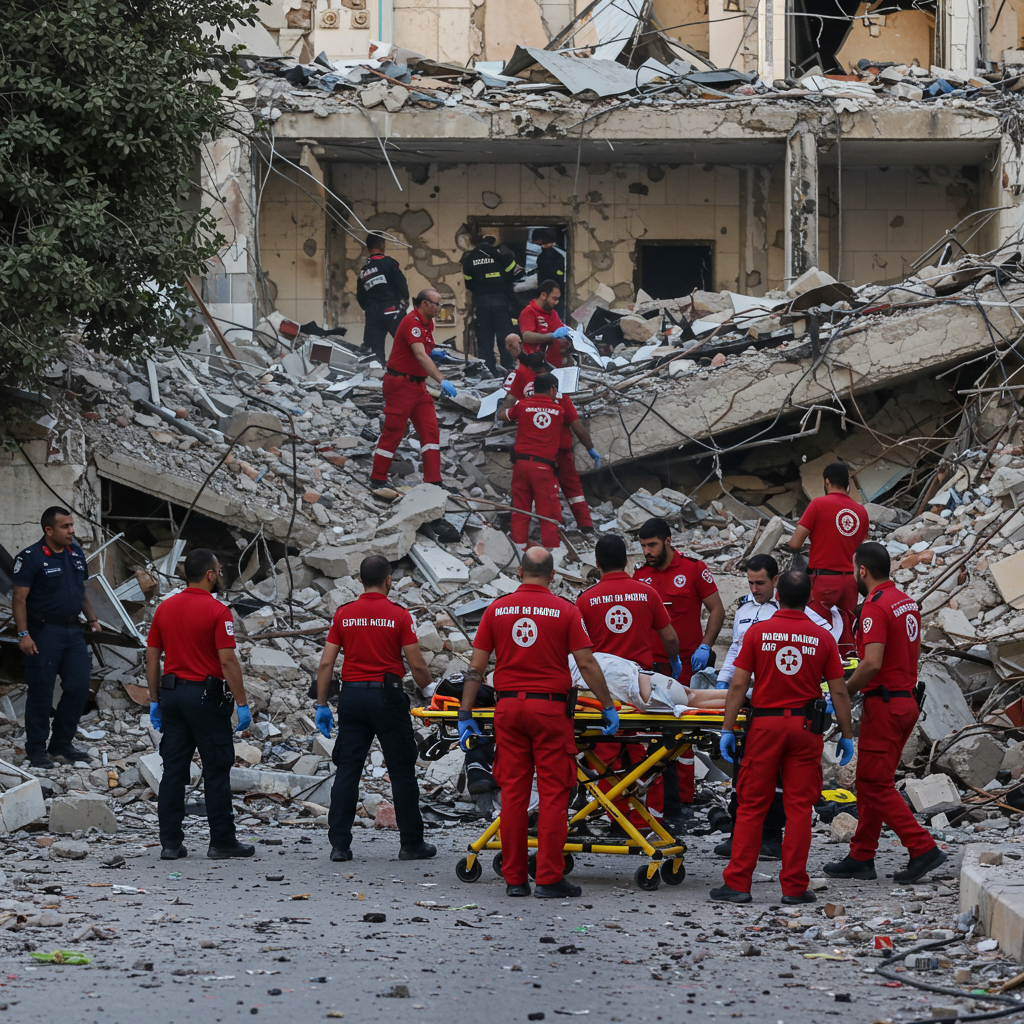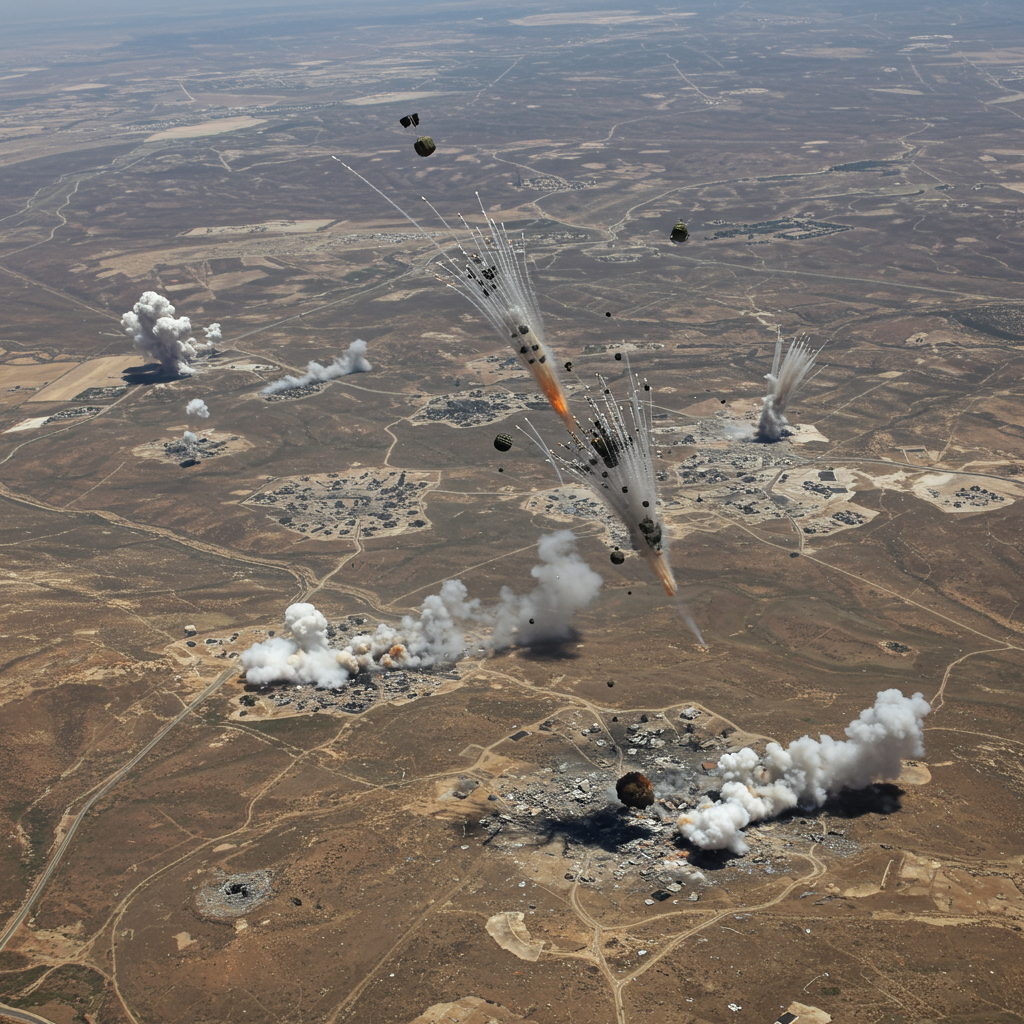Deadly Iran Missile Strikes Slam Israel, Raising Casualties
A new wave of missile attacks launched by Iran struck Israel early Monday morning, resulting in significant casualties and damage across central parts of the country. Reports from Israeli emergency services indicate at least eight people were killed and dozens more were wounded in these assaults, marking a severe escalation in the ongoing conflict.
The Magen David Adom (MDA) emergency service confirmed that among those killed were four individuals in their 70s. The widespread impact led to over 100 people being evacuated and transported to hospitals, with one 30-year-old woman reported in serious condition. Rescue teams have been actively searching for individuals trapped beneath rubble following direct hits on buildings. Harrowing rescues included pulling a six-day-old baby from the destruction.
These latest strikes have tragically increased Israel’s total death toll since the conflict began on Friday to at least 24, with more than 500 people reported wounded. Israeli officials state the country has faced over 370 missiles and hundreds of drones launched by Iran and its proxies.
Damage Reported in Residential Areas and Near US Embassy
The Iranian barrages struck multiple sites, causing considerable damage. In the central Israeli city of Petah Tikva, a residential building sustained a direct hit, leaving concrete walls charred, windows shattered, and apartments ripped apart. Explosions, likely from Israel’s defense systems intercepting incoming projectiles, were widely heard across cities like Tel Aviv and Petah Tikva shortly before dawn.
Additionally, a missile reportedly fell near the U.S. Embassy branch office in Tel Aviv. U.S. Ambassador to Israel Mike Huckabee stated on social media that the blast caused minor property damage from concussions, though thankfully no U.S. personnel were injured.
Israel Retaliates, Claims Aerial Superiority
In swift response to the renewed attacks, the Israeli military reported its fighter jets struck 10 command centers belonging to the Quds Force, an elite external operations arm of Iran’s Revolutionary Guard, located in Tehran. The IDF also stated it targeted surface-to-surface missile sites in central Iran.
The Israeli military claimed to have achieved “full air supremacy” over Tehran and the skies from western Iran to the capital, asserting that its aircraft can now operate freely. They reported destroying over 120 surface-to-surface missile launchers firing at Israel in recent overnight missions.
Iran Vows Stronger Attacks Amidst Escalation
Iran announced it had launched approximately 100 missiles in this latest wave, characterizing the strikes as retaliation for Israel’s extensive attacks on its military and nuclear infrastructure. On Sunday, Iran’s Foreign Minister had suggested Iran would halt its strikes if Israel ceased its offensive. However, following a day of intensified Israeli aerial assaults on Monday that broadened targets to include oil refineries and government buildings, the Revolutionary Guard issued a hardline statement, vowing subsequent strikes would be “more forceful, severe, precise and destructive than previous ones.”
Contested Casualty Figures in Iran
The Israeli offensive has also resulted in significant casualties in Iran. Iranian authorities report at least 224 people killed and roughly 1,300 wounded since Friday. While they claim the vast majority of casualties were civilians, rights groups dispute the official figures. Washington-based Iranian advocacy group Human Rights Activists suggests the government is undercounting, stating they have documented over 400 deaths, including 197 civilians.
Underlying Tensions: Iran’s Nuclear Program
The current flare-up stems from Israel’s initial strike on Friday, which targeted the heart of Iran’s nuclear program, killing several nuclear scientists and high-ranking military leaders. Israel maintains its actions are necessary to prevent Iran from obtaining a nuclear weapon.
Conversely, Iran insists its nuclear program is solely for peaceful purposes. U.S. intelligence agencies and the International Atomic Energy Agency have stated Iran was not actively pursuing a nuclear weapon as of 2003. However, concerns persist as Iran has significantly enriched uranium to near weapons-grade levels in recent years, potentially giving it the capacity to develop multiple weapons relatively quickly should it choose to do so.
The conflict has also reportedly involved intelligence activities, with Israel’s Mossad spy agency allegedly positioning assets inside Iran ahead of the initial attack. Iran has since detained individuals suspected of espionage, with state television reporting the hanging of a doctor convicted of supplying sensitive information to the Mossad on Monday.
As the conflict enters its fourth day, both sides appear entrenched in their positions, with a clear risk of further escalation.


